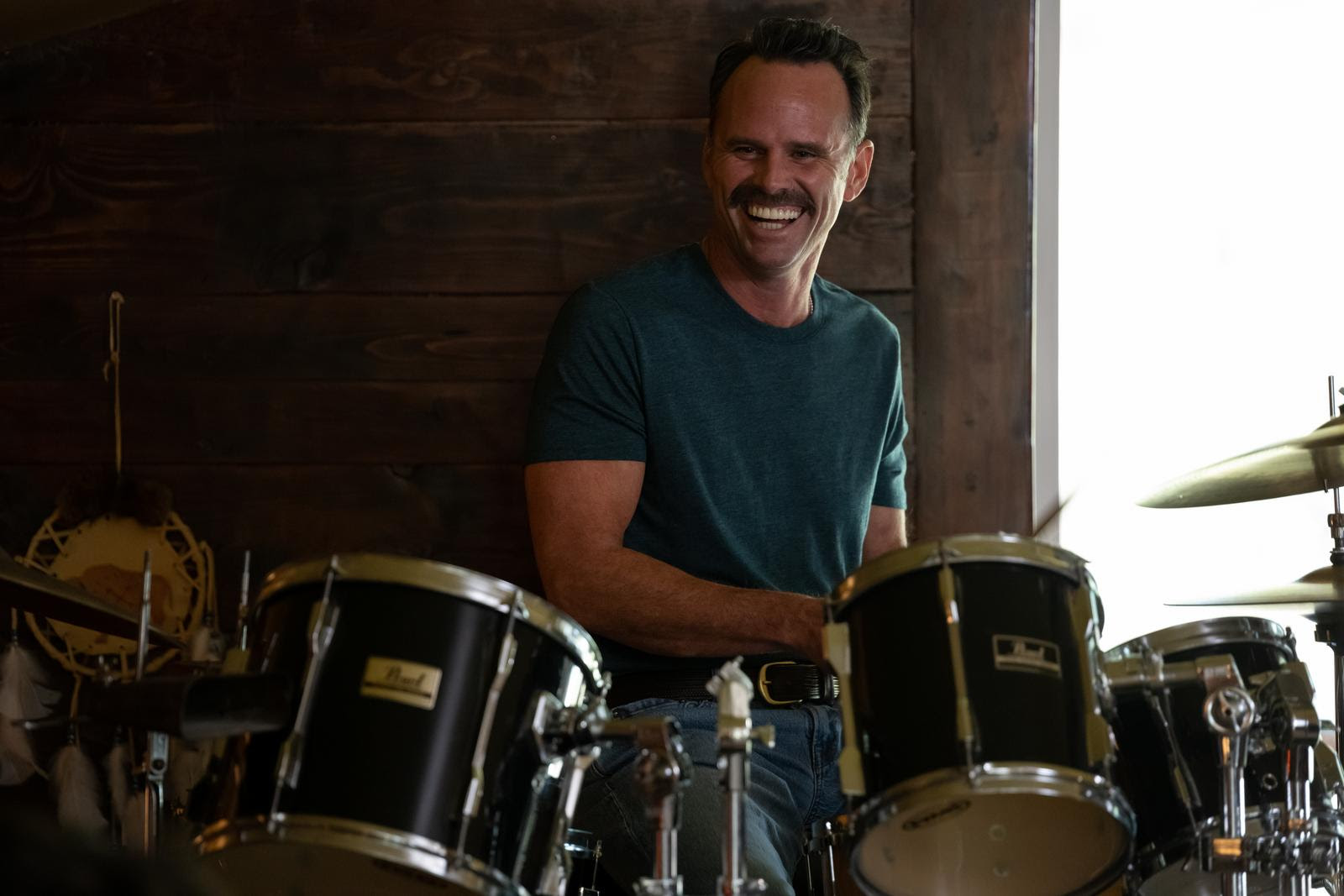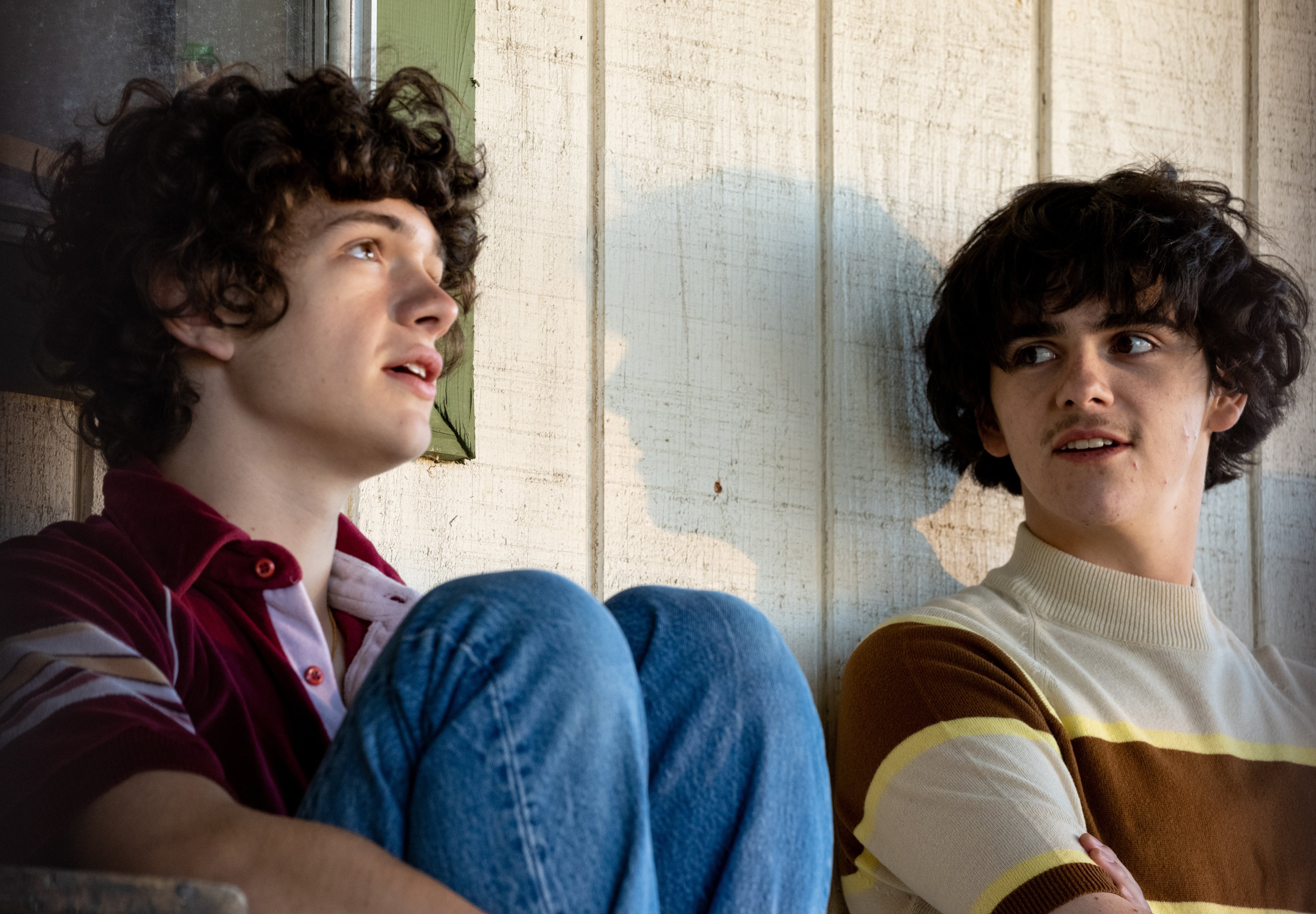Where do great songs come from? Who really knows? Maybe the more piercing question is, Where do they go if no one hears them? Bill Pohlad’s Dreamin’ Wild is on the surface a straightforward story—based on real-life events—about what happens when two people who sought pop stardom as teenagers get a second chance in middle age. But in telling the story of Donnie and Joe Emerson—who, as kids in 1979, independently recorded a strange, wonderful album that almost nobody heard—Pohlad seems to be striving to capture an elusive cloud of feeling. This isn’t just a movie about reawakened ambitions, but about how our teenage hopes inform our grownup selves, or perhaps haunt them. It’s a lot to pack into a seemingly unassuming little movie, but Pohlad—who also directed 2014’s superb Love & Mercy—pulls it off.
Casey Affleck plays Don Emerson, a struggling, middle-aged pro musician living in Washington State. He sings and plays guitar in a small band with his wife, drummer and percussionist Nancy (Zooey Deschanel), also the mother of his two kids. But his chief means of support is a small recording studio that’s a losing proposition. He’s tried to make a life in music, but the effort is draining him. Affleck, in this wonderful performance, conveys that existential heaviness without dragging the movie down; he shoulders his character's burdens rather than heaping them onto us.
Read more: The 100 Best Movies of the Past 10 Decades
Things used to be different for Don, because who can ever hang onto every remnant of the teenage self? The movie’s opening scene, a flashback memory, shows a teenage Donnie—played by Noah Jupe—working out a song on his guitar, though it’s really less a song than a moonlit current with a few words floating on the surface: “Did you have a good time?” he asks, in a voice at the silvery midpoint between boy and man. He’s posing this question to an unseen girl, and the way he sings it, he seems genuinely curious to hear the answer. It’s not much of a song, yet it’s more than enough. As Donnie sings, he’s moving toward a door of light, which opens into a space filled with an adoring audience, a crowd deeply in love with the sound he and his older brother and bandmate Joe (played, as a teenager, by Jack Dylan Grazer) are spinning out from the stage. This is what young Donnie had dreamed of; the struggling wedding band and the failing recording studio is what he got.
But the story of the Emerson brothers takes a strange and miraculous turn, and that’s the adventure that Pohlad—who also wrote the script, adapted from a New York Times story by Steven Kurutz—explores here. As music-mad kids in the late 1970s, Donnie and Joe had recorded an album, self-financed—at great cost—by their father, Don Sr. (Beau Bridges), a logger and a gentle, emotionally generous family man whose acreage dwindled as he poured money into his sons’ aspirations. That record, Dreamin’ Wild, obviously went nowhere. Fast-forward some 30 years, and an indie record exec shows up, Chris Messina’s Matt Sullivan. Sullivan, of Light in the Attic Records, a company devoted to resurrecting lost gems, has heard the Emersons’ record and wants to rerelease it. Don Sr., Joe, and the rest of the family (including mom Salina, played by Barbara Deering) are thrilled—they’ve always believed in Donnie and Joe’s talent, despite the massive stacks of unsold records they’ve been storing for years.

Only Don refuses to believe in this resurrected fantasy, for numerous and complicated reasons that unfold in subtle ripples. He remembers what it was like to make music with his brother when they were kids—they lived for it, but they were also doing it for fun. For him, the record’s failure still stings: “We put all we had into it and no one liked it.” Even more than that, he feels undone by guilt—over the sacrifices his adoring parents made for a career that went nowhere, and over his complicated love for his brother. It turns out that Donnie was the big talent, with a gift for writing, performing, and producing. Joe, a middling drummer at best, just tagged along for fun. As a grown-up, Joe has stayed close to home, perpetually working on the beautiful house where he lives, alone. (Walton Goggins, a fantastic actor, signals the backstory behind that house in the subtlest, most heartrending way.) The grown-up Don, on the other hand, has built his whole life around music, and he can’t yet see the meeting point between the brothers’ lives today and the astonishing feat of creation they'd pulled off long ago, in the little log-cabin recording studio their father had built for them.
What Pohlad and his actors—all of them wonderful, among the best ensemble of performers we’re likely to see all year—pull off is a rich and often deeply moving meditation on what music can mean in a life. It can break dreams, but it can also mend them. This is also a movie about the complex nature of family love, and how even the strongest bonds can become entwined with regrets and self-recrimination.

That’s a lot for a movie to hold. But Pohlad—who has largely worked as a producer, though he’s also proving to be a fine director—knows what he’s doing. With Love & Mercy, anchored by a sterling performance from Paul Dano as the troubled genius Brian Wilson, Pohlad plumbed—as much as any human can—the mystery and craftsmanship behind song creation. Dreamin’ Wild is in some ways a more modest movie, though it’s ultimately just as powerful. The performances given by Jupe and Grazer, as the young versions of Don and Joe, carry all the threads of the complicated adult family dynamic that will eventually take shape. Watching them is like peering into the brothers’ future; this can’t be easy to pull off.
And hovering above, behind, and all the way through Dreamin’ Wild is the music itself, like a radio signal coming right at us from the lost world of 1979. The song that would have been the album’s single, “Baby,” a winsome ballad whose lyrics consist largely of a single repeated line—it’s either “Yes oh baby” or the seemingly nonsensical yet even more perfect “You’re so baby,” depending on how your brain is working at any particular moment—weaves through the film like a listless ghost looking for home. How do you write a song like that, at 15 or at any age? And what must it be like to have given that song up as a lost cause, only to see it find a new audience 30 years later? The annals of pop music must be filled with good-to-great songs that never found listeners; in that sense, the first part of the Emersons’ story isn’t atypical. But the fact that we can now listen to “Baby” on repeat if we want, whether via a download or wafting from the grooves of a record, still seems like a minor miracle. It’s the essence of the teenage rock ’n’ roll dream fulfilled, better late than never, and the lost years in between only make its sound sweeter.
- The Trump Indictment History Will Remember
- Extreme Heat Is Endangering America's Workers—and Its Economy
- New Technique Helps Paralyzed Man Move and Feel Again
- Oppenheimer's Grandson on Oppenheimer
- Don't Ignore Your Climate Anxiety: Essay
- Here Are the 10 New Books You Should Read in August
- Podcast: Why Candace Bushnell Regrets Thinking So Much About Relationships
- Sign Up for Extra Time, Your Guide to the Women's World Cup
"story" - Google News
August 05, 2023 at 03:20AM
https://ift.tt/aCRW1Bu
Dreamin' Wild Is a Moving True Story of a Teenage Rock Dream Fulfilled - TIME
"story" - Google News
https://ift.tt/E7wAVJB
https://ift.tt/OuK3kiq
Bagikan Berita Ini














0 Response to "Dreamin' Wild Is a Moving True Story of a Teenage Rock Dream Fulfilled - TIME"
Post a Comment